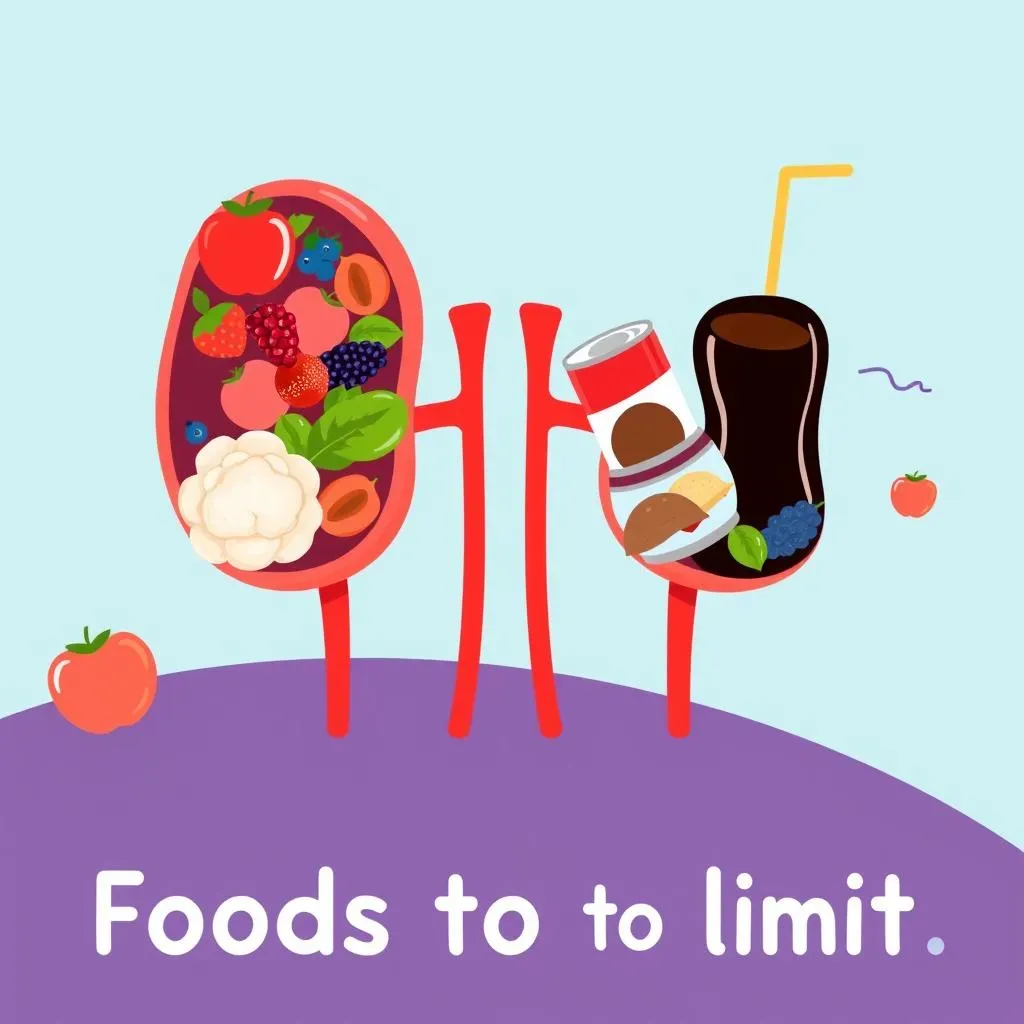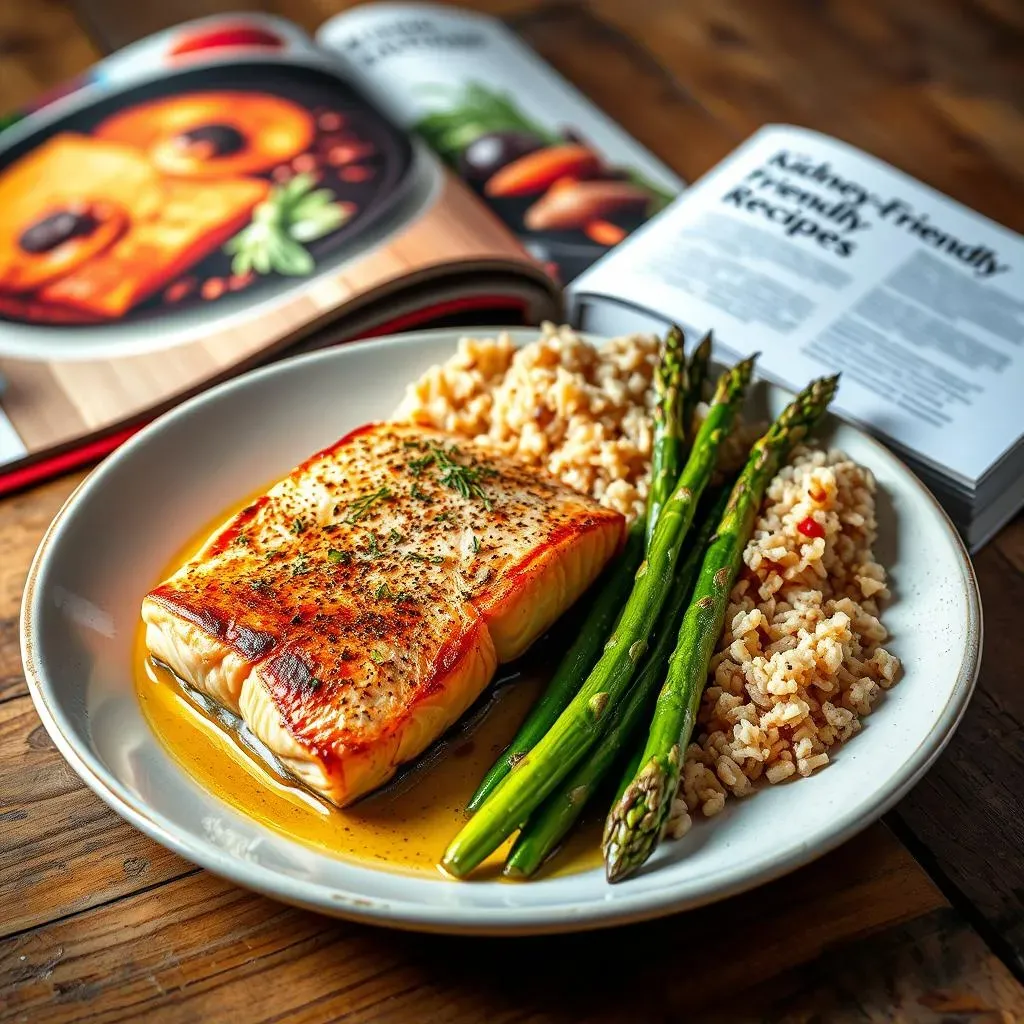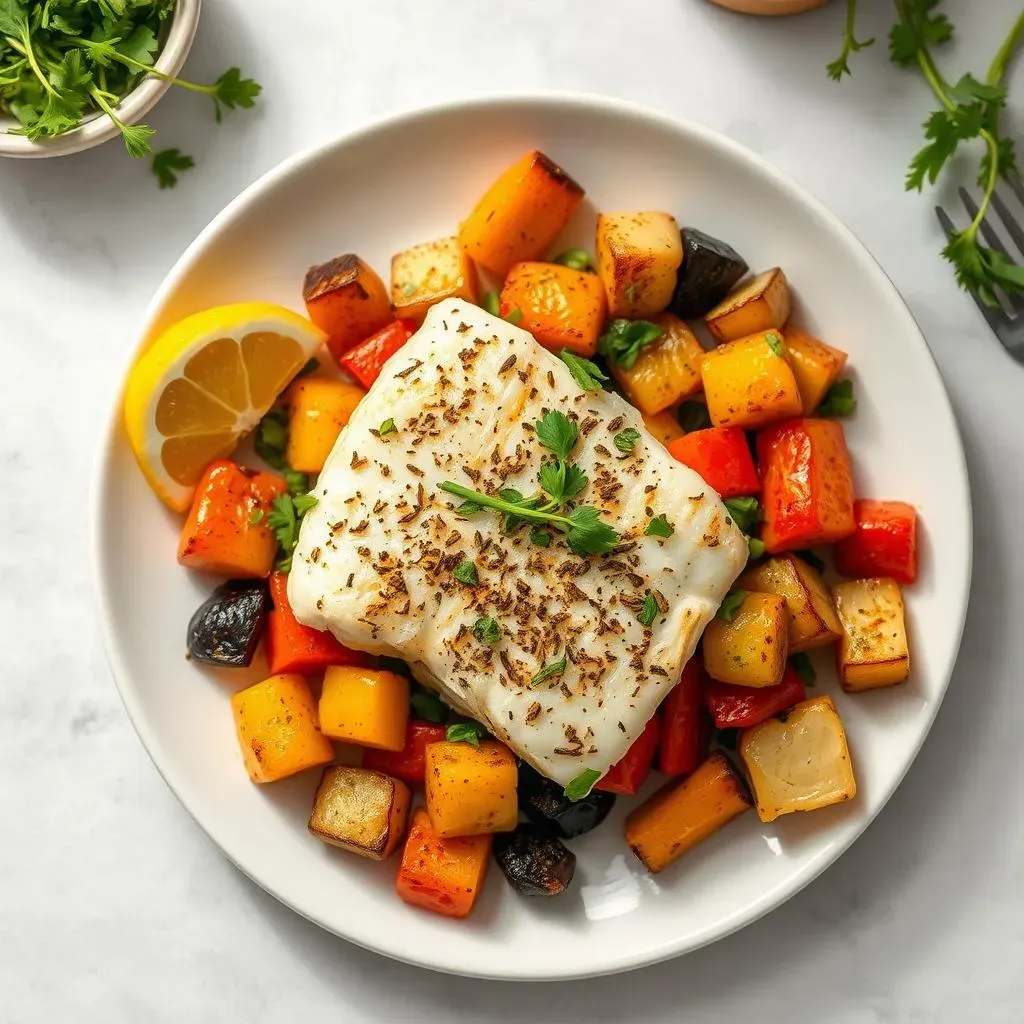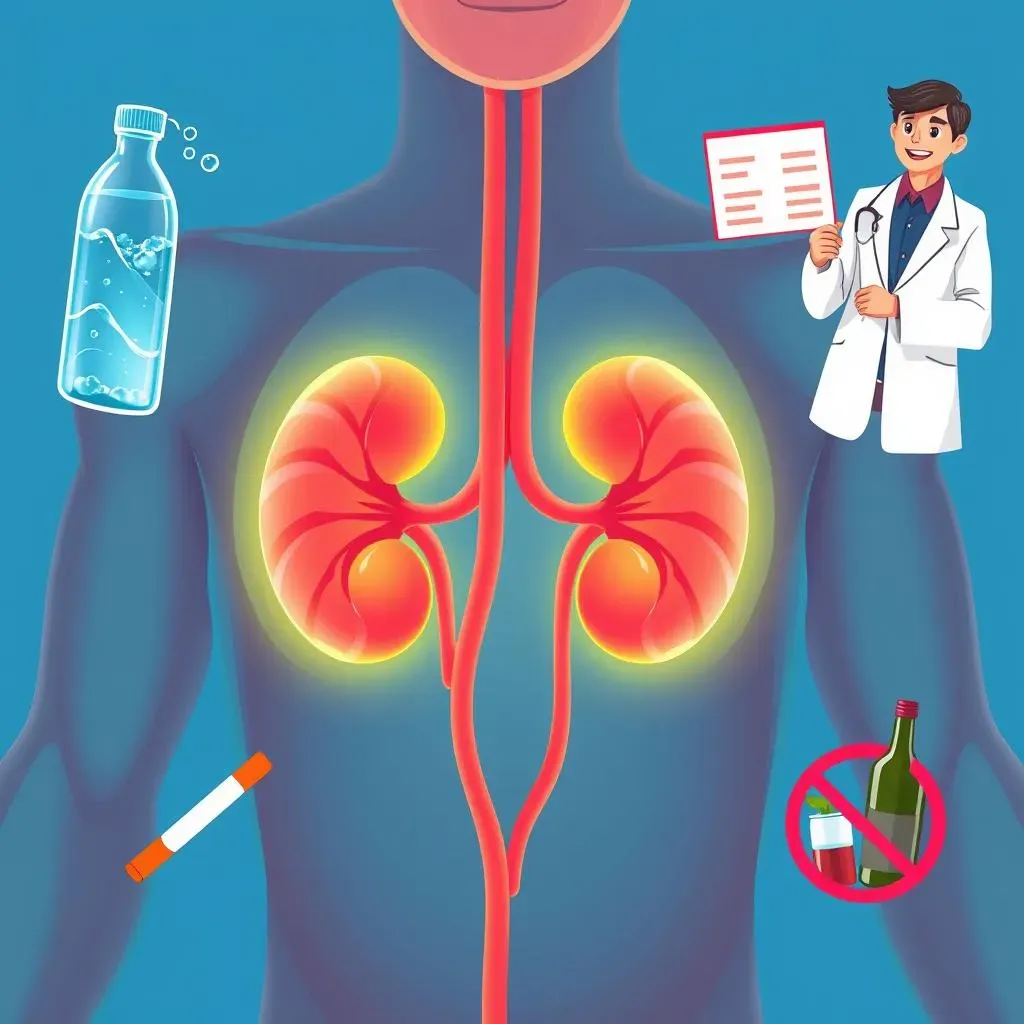Table of Contents
Worried about what to eat when you're trying to keep your kidneys healthy? You're not alone. Navigating the world of renal diets can feel like decoding a secret menu, but it doesn't have to be that way. A kidney healthy dinner can be both delicious and beneficial, and this article is your guide to making it happen.
Understanding Kidney Health and Diet

Understanding Kidney Health and Diet
The Kidneys' Vital Role
Let's kick things off with a quick kidney crash course. These bean-shaped organs are your body's ultimate filtration system, working tirelessly to remove waste, excess fluid, and toxins from your blood. They also play a key role in regulating blood pressure, producing hormones, and keeping your bones strong. When your kidneys are healthy, they're like the unsung heroes of your body, quietly keeping everything running smoothly. But when they're not functioning properly, it can throw your whole system out of whack.
Think of your kidneys like the engine oil filter in your car. If that filter gets clogged, the engine doesn't run well, right? Same deal with your kidneys. When kidney disease strikes, it means these filters are damaged and can't do their job as efficiently. This can lead to a buildup of waste in your blood, which can cause a whole host of health problems. That's why understanding kidney health is so important, especially when it comes to your diet.
Why Diet Matters for Kidney Health
So, why is diet so crucial for kidney health? Well, what you eat directly impacts the workload on your kidneys. Certain foods can put extra stress on these organs, while others can support their function and help them do their job more effectively. A kidney-friendly diet isn't about deprivation; it's about making smart choices that nourish your body and protect your kidneys.
For instance, if you have kidney disease, your doctor might recommend limiting certain nutrients like sodium, phosphorus, and potassium. This is because damaged kidneys can't always process these minerals efficiently, leading to a buildup in your blood. On the flip side, a diet rich in fresh fruits, vegetables, and lean protein can provide your kidneys with the nutrients they need to function optimally. It's all about finding the right balance and tailoring your diet to your specific needs. It's like giving your kidneys the right fuel to keep them running smoothly for years to come.
Nutrient | Why It Matters for Kidneys | Foods to Limit | Foods to Include |
|---|---|---|---|
Sodium | High sodium can raise blood pressure, stressing kidneys. | Processed foods, canned soups, salty snacks | Fresh fruits & veggies, homemade meals with herbs & spices |
Phosphorus | Damaged kidneys struggle to remove excess phosphorus. | Dairy, processed foods, dark colas | Fresh produce, whole grains (in moderation) |
Potassium | High potassium can cause heart problems in kidney disease. | Bananas, oranges, potatoes, tomatoes | Apples, berries, grapes, cauliflower |
Planning Your Kidney Healthy Dinner: Key Nutrients

Planning Your Kidney Healthy Dinner: Key Nutrients
Prioritizing Low Sodium Choices
Sodium is a big one when it comes to kidney health. Too much sodium can raise your blood pressure, which puts extra strain on your kidneys. The goal here is to keep sodium levels in check without sacrificing flavor. It's totally doable, promise! Instead of reaching for the salt shaker, experiment with herbs, spices, and citrus to add zest to your meals. Think lemon pepper on grilled chicken or a sprinkle of smoked paprika on roasted vegetables. Get creative and discover new flavor combinations that you love.
When you're shopping, become a label detective. Pay close attention to the sodium content of packaged foods, and opt for low-sodium or no-salt-added versions whenever possible. Canned goods, processed meats, and frozen meals are often loaded with sodium, so try to limit these items or choose fresh alternatives. Cooking at home gives you much more control over the amount of sodium in your food, so embrace your inner chef and whip up some delicious, kidney-friendly creations.
Balancing Phosphorus and Potassium
Phosphorus and potassium are two other minerals that need careful attention in a kidney-friendly diet. Damaged kidneys can have trouble removing excess phosphorus and potassium from your blood, which can lead to health problems. But don't worry, it's all about finding the right balance.
For phosphorus, focus on limiting high-phosphorus foods like dairy products, processed foods, and dark colas. Instead, opt for fresh produce, whole grains (in moderation), and lean protein sources. When it comes to potassium, it's important to know that some fruits and vegetables are higher in potassium than others. Bananas, oranges, potatoes, and tomatoes are generally high in potassium, while apples, berries, grapes, and cauliflower are lower. Talk to your doctor or a registered dietitian to determine the right potassium levels for you and to create a personalized meal plan.
Embracing Kidney-Friendly Protein Sources
Protein is essential for building and repairing tissues, but it's important to choose kidney-friendly protein sources. Too much protein can put extra strain on your kidneys, so moderation is key. Lean protein sources like fish, poultry, eggs, and plant-based proteins are generally good choices.
When you're planning your kidney healthy dinner, consider incorporating grilled salmon with roasted asparagus, a chicken stir-fry with brown rice, or a lentil soup with whole-grain bread. These meals provide a good source of protein without overloading your kidneys. Remember to portion your protein appropriately and to balance it with plenty of fresh fruits and vegetables. With a little planning and creativity, you can enjoy delicious, protein-rich meals that support your kidney health.
Delicious KidneyFriendly Dinner Recipes to Try

Delicious KidneyFriendly Dinner Recipes to Try
Alright, let's get to the good stuff! Finding delicious kidney-friendly dinner recipes can feel like a treasure hunt, but trust me, the rewards are worth it. The key is to focus on fresh, whole ingredients and to get creative with flavors. Think beyond bland and boring – kidney-friendly meals can be vibrant, satisfying, and downright delicious. We're talking about recipes that will make you forget you're even on a special diet!
I'm going to share a few of my favorite recipes that are not only kidney-friendly but also easy to make and packed with flavor. These recipes are designed to be low in sodium, phosphorus, and potassium, while still providing you with the nutrients you need to stay healthy and energized. So, grab your apron and let's get cooking!
Lemon Herb Baked Cod with Roasted Vegetables
This recipe is a winner because it's simple, flavorful, and packed with nutrients. Cod is a lean protein source that's low in phosphorus, and the lemon herb marinade adds a burst of flavor without the need for salt. Roasting the vegetables brings out their natural sweetness and makes them tender and delicious.
Ingredients:
- 4 cod fillets (4-6 oz each)
- 1 lemon, juiced and zested
- 2 cloves garlic, minced
- 1 tbsp olive oil
- 1 tsp dried thyme
- 1 tsp dried rosemary
- 1 red bell pepper, chopped
- 1 yellow bell pepper, chopped
- 1 zucchini, chopped
- 1 cup cauliflower florets
Instructions:
- Preheat oven to 400°F (200°C).
- In a bowl, whisk together lemon juice, lemon zest, garlic, olive oil, thyme, and rosemary.
- Place cod fillets in a baking dish and pour marinade over them.
- In a separate bowl, toss bell peppers, zucchini, and cauliflower with a drizzle of olive oil.
- Arrange vegetables around the cod fillets in the baking dish.
- Bake for 15-20 minutes, or until cod is cooked through and vegetables are tender.
Nutrient | Amount per Serving |
|---|---|
Sodium | Less than 150mg |
Phosphorus | Approximately 200mg |
Potassium | Approximately 300mg |
Chicken and Vegetable Stir-Fry with Low-Sodium Soy Sauce
Stir-fries are a fantastic way to pack in lots of vegetables and lean protein, and they're super quick to make. The key to keeping this dish kidney-friendly is to use low-sodium soy sauce and to load up on low-potassium veggies.
Ingredients:
- 1 lb boneless, skinless chicken breasts, cut into bite-sized pieces
- 1 tbsp olive oil
- 1 onion, chopped
- 2 cloves garlic, minced
- 1 cup broccoli florets
- 1 cup sliced carrots
- 1 cup sliced bell peppers (any color)
- 1/2 cup sliced mushrooms
- 2 tbsp low-sodium soy sauce
- 1 tbsp cornstarch
- 1/4 cup water
Instructions:
- In a bowl, toss chicken with cornstarch.
- Heat olive oil in a large skillet or wok over medium-high heat.
- Add chicken and cook until browned and cooked through. Remove chicken from skillet and set aside.
- Add onion and garlic to the skillet and cook until softened.
- Add broccoli, carrots, bell peppers, and mushrooms to the skillet and cook until tender-crisp.
- In a small bowl, whisk together low-sodium soy sauce and water.
- Pour soy sauce mixture over vegetables and bring to a simmer.
- Return chicken to the skillet and stir to combine.
- Serve over brown rice or quinoa.
Tips for Maintaining a Kidney Healthy Lifestyle

Tips for Maintaining a Kidney Healthy Lifestyle
Stay Hydrated: Water is Your Best Friend
Staying hydrated is absolutely crucial for kidney health. Water helps your kidneys flush out waste and toxins, preventing them from building up and causing damage. Aim to drink at least eight glasses of water a day, and even more if you're active or live in a hot climate. Carry a water bottle with you and sip on it throughout the day to stay hydrated on the go. It's a simple habit that can make a big difference in the long run.
Not a fan of plain water? No problem! You can add slices of lemon, cucumber, or berries to infuse your water with flavor. Herbal teas and diluted fruit juices are also good options, but be mindful of the sugar content. Avoid sugary sodas and sweetened beverages, as they can put extra stress on your kidneys. Think of water as your kidneys' best friend – the more you drink, the happier they'll be!
Regular Check-ups: Know Your Numbers
Regular check-ups with your doctor are essential for monitoring your kidney health, especially if you have risk factors like diabetes, high blood pressure, or a family history of kidney disease. Your doctor can perform blood and urine tests to assess your kidney function and to detect any early signs of problems. Knowing your numbers, such as your creatinine levels and GFR (glomerular filtration rate), can help you take proactive steps to protect your kidneys.
Don't be afraid to ask your doctor questions about your kidney health and to discuss any concerns you may have. Early detection and treatment are key to preventing kidney disease from progressing. Think of your check-ups as an investment in your long-term health and well-being. It's like getting a regular tune-up for your car – it helps keep everything running smoothly and prevents major problems down the road.
Limit Alcohol and Avoid Smoking
Both alcohol and smoking can have a negative impact on your kidney health. Excessive alcohol consumption can raise your blood pressure and damage your kidneys, while smoking can reduce blood flow to the kidneys and worsen kidney disease. Limiting alcohol and quitting smoking are two of the best things you can do to protect your kidneys.
If you choose to drink alcohol, do so in moderation. That means no more than one drink per day for women and no more than two drinks per day for men. If you smoke, talk to your doctor about ways to quit. There are many resources available to help you kick the habit, including support groups, counseling, and medications. Your kidneys will thank you for it!
Wrapping Up: Your Journey to Kidney-Healthy Dinners
Creating kidney-healthy dinners doesn't have to feel like a chore. With a little knowledge and some creative cooking, you can enjoy delicious and satisfying meals that support your kidney health. Remember to focus on fresh, whole foods, control your intake of sodium, phosphorus, and potassium, and stay hydrated. By incorporating the tips and recipes shared in this guide, you're well on your way to a kidney-conscious lifestyle that benefits your overall well-being. So, keep experimenting, keep learning, and most importantly, keep enjoying your food!